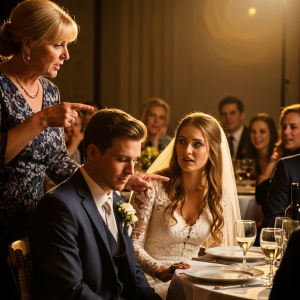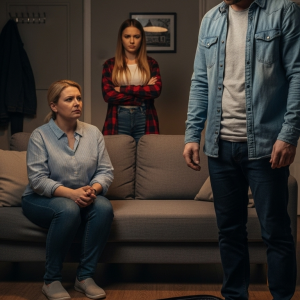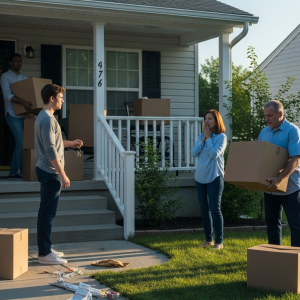I have a younger sister, Lisa, who I believe is the true incarnation of evil on Earth. My parents, however, see her as their “miracle child.” My mother had a miscarriage before Lisa was born, and the loss affected her deeply. When Lisa arrived a few years later, she became a beacon of hope, the center of our family’s universe, showered with an affection I never knew.
I loved her when we were children, but I slowly realized she had an incredible talent for manipulation. When I was given a family heirloom pocket watch for my birthday, she became intensely jealous. That night, knowing I was terrified of spiders, she placed one in my pillowcase. When I woke up screaming, she feigned surprise and concern, only to admit to me later with a creepy grin, “That will teach you a lesson.”
Over the years, I told my parents about her antics, but they always chalked it up to her being young and naive. They saw me as the troublemaker. I eventually stopped speaking up and focused on my studies, getting into a good college and moving out as soon as I could. I rarely visited home. Lisa, who didn’t have the grades for a university, stayed at home, attending community college.
Now, I am 23 and working at a multinational corporation in San Francisco. My father recently had a near-fatal heart attack. When my mother called, I immediately flew home to be there for them. His brush with death made him want to spend more time with us, and he suggested a family vacation. I had my reservations, but knowing how important it was to him, I agreed. Lisa wasn’t thrilled, but she had no choice but to go along with it.
I planned my leave from work, genuinely looking forward to spending quality time with my parents. However, when we arrived at the airport, I found out my flight ticket had been canceled. My father insisted he had booked and paid for it. When we checked further, it turned out that of the four tickets, only the one with my name on it had been mysteriously canceled.
I looked over at Lisa. She had a sly, triumphant smile on her face—the same expression she wore after every successful manipulation. I knew instantly she had done it.
I started yelling at her, pointing out to my parents that she never wanted me on this trip. Instead of believing me, my mother immediately dismissed my claim.
“Your sister would never do something like that,” she said sharply. “Stop being so jealous of her. It was just a freak accident.” My father agreed, suggesting it was an airline mistake.
I was utterly frustrated. There were no other flights that day. My father was initially hesitant, but then started talking about how long it had been since he’d been on vacation. My mother chimed in, “You always travel for work, so you won’t miss out on much.”
Their comments felt like they wanted me to insist they go without me. It became clear they didn’t mind having this family vacation as a family of three. So, I told them to go ahead. I stood alone at the airport as my parents and Lisa headed for their much-anticipated trip. I flew back to San Francisco that day, not wanting to spend another minute in our family house.
A few days into their vacation, I woke up to several missed calls from my mother. Worried about my father’s health, I immediately called her back. She sounded extremely distressed.
“Something terrible has happened,” she began. Apparently, my father’s essential heart medications had been disappearing day by day. They were in a foreign country and terrified. They had searched their room everywhere in vain.
My mother had gone to Lisa’s adjacent hotel room to borrow some sunscreen while Lisa was out. To her utter shock and dismay, she discovered all the missing medication, carefully tucked away inside Lisa’s bedside table.
It was a chilling revelation. She immediately called for my father, who rushed in and found all his missing pills. I guess this is when the truth finally dawned on them: their beloved daughter, the so-called miracle child, had been intentionally jeopardizing my father’s health, putting his life at great risk.
My mother’s voice quivered as she asked what they should do. I told her not to confront Lisa until they were back home, that she would only lie and manipulate her way out of it. However, they must have confronted her that night.
I received a late-night call from my father, his voice trembling. Lisa was in jail.
He recounted that when they asked her about the medications, she had a full-blown tantrum, throwing objects and shouting insults. Her rage was targeted at my father, accusing him of booking a ticket for me in the first place. She told them that if they continued having a relationship with me, she would teach them a lesson they would never forget. The situation escalated until someone from the hotel called the authorities. When the officers arrived, she insulted them, which led to her being taken into custody.
Desperate to return home after Lisa’s release, my parents’ plans were foiled again when they discovered their passports and wallets were missing. Lisa had either discarded them or hidden them away. They were stranded.
This was the first time my parents truly saw my sister for who she really was. My mother, who had defended Lisa for years, was now begging me for help.
Upon their return home, my parents confronted Lisa and told her she needed to leave. This started another screaming match. Lisa began hurling accusations, claiming she didn’t want to share them and that she had been pushed to the brink when they invited me. She insisted they should disown me.
Then, she threatened them. In a fit of desperation and anger, she claimed that she would go around telling everyone that they had neglected her as a child, accusing them of parental negligence. This terrified my parents, as they were well-respected doctors in our community. The thought of their reputations being ruined by false accusations left them feeling trapped.
Lisa’s behavior continued to worsen. She broke dishes, stole their car keys, and threw massive tantrums. One night, my mother called me in tears after Lisa went on a rampage, breaking furniture because my mother was too tired to cook for her.
The situation was escalating, and I was increasingly concerned she posed a real threat to them. With Lisa’s increasing antics, the inevitable finally happened. One night, during a big fight, she came at our parents with a knife. Terrified, they were forced to call the police. She was arrested on charges of assault.
With Lisa in custody, our parents decided it was time for a permanent solution. They consulted with an attorney and began the legal process for evicting her from their home. They bailed her out of jail and handed her the formal notice. She is going to be out by next week.
My parents have since flown to San Francisco to spend a few days with me, to take some time away from the crisis. Yesterday evening, as we gathered around my dining table, they began to open up, their voices laced with humility and regret. They admitted that they had been blind to Lisa’s true nature for years and begged for my forgiveness.
My father expressed his remorse for not heeding my warnings earlier. My mother, her voice trembling, acknowledged the gravity of their mistake in dismissing my concerns about Lisa’s behavior. “We failed you,” she whispered, “by favoring her.”
I let them know I appreciated them taking this first step. I shared painful memories of the torment I endured due to Lisa’s actions, and they listened, utterly shocked at the extent of what I had gone through alone. They acknowledged the pain and expressed regret over the isolation I felt in my own family.
It was a bittersweet moment. While it may not have been the ideal way to mend our relationship, it was a turning point. For the first time in years, we were truly acknowledging the issues that had plagued our family. I told them that it would take me some time to trust them again, and we all agreed to work through this together.
We have since discussed what to do with Lisa. We can’t simply abandon her. We’ve come to terms with the fact that her behavior might be indicative of deeper mental health issues. My parents plan on reaching out to her once they are back home to encourage her to seek a voluntary evaluation. I don’t want to contact her, as she still holds a strong grudge against me. Our primary goal is for Lisa to grasp our perspective and, most importantly, recognize the deep love and concern we still hold for her. It’s not about assigning blame, but about coming together as a family to address the issues that have strained our relationships.
After my parents returned to San Francisco, the house felt… different. Not just because they were away from Lisa, but because for the first time in years, I saw them as people instead of just “Mom” and “Dad.” People who were exhausted, fragile, and maybe—finally—ready to see reality.
They stayed in our guest room, sleeping more in two days than I’d ever seen them rest. My mom kept apologizing for the smallest things, as if she needed to make up for decades of blindness. My father, who used to avoid uncomfortable topics, was suddenly the one asking the most direct questions: “When did you first realize Lisa was dangerous?” “What exactly did she do to you in high school?”
At first, I gave vague answers, afraid they’d shut down if I was too blunt. But one evening over dinner, my father pressed again.
“Please,” he said, “don’t protect us from the truth. We need to know.”
So I told them everything.
I told them about the year Lisa poured bleach into my laundry because she “didn’t like how my clothes smelled.” About the time she stole my debit card and ordered over $400 worth of makeup, then convinced them I had done it to “frame her.” About the summer before college when she deliberately let my beloved dog out of the backyard and lied about it for weeks until a neighbor finally told me the truth.
My mom cried quietly. My father didn’t speak for a long time.
Finally, he said, “We should have protected you.”
“You should have believed me,” I replied, my voice shaking. “Even once. Just once.”
It wasn’t about revenge or making them feel guilty—it was about putting the truth out in the open where it could no longer be denied.
While my parents were with me, Lisa was still at their house, stewing. I’d blocked her on every platform, but my parents received a stream of texts and voicemails.
At first, she demanded they “take back” the eviction notice, claiming she had nowhere to go. Then she shifted to rage, accusing them of being “brainwashed” by me. She said she’d “rather die than live in a world” where I had their support.
Her words would have terrified me years ago. Now, I just felt tired.
My parents forwarded everything to their lawyer, who advised them to avoid responding directly. The eviction date was set, and any communication would only complicate matters.
Still, I couldn’t shake the image of her alone in that house, simmering with resentment, capable of almost anything.
The night before the eviction, I got a call from my dad. His voice was grim.
“She’s gone,” he said.
Gone—not in the tragic, irreversible sense. But she had packed what she could carry and left, without saying where. The neighbors reported seeing a man with her, someone they didn’t recognize, loading her boxes into a van.
There was no note, no forwarding address, nothing.
My mother’s first reaction was panic—What if she’s in trouble?—but my father pointed out that this was likely intentional. “She wants us to worry,” he said. “She wants control.”
It was eerie, the sudden absence. My parents returned home to a house that was quieter than it had been in years. No slammed doors. No shouting. No broken glass.
But also… no closure.
Two weeks later, my parents received a letter from Lisa. Not an apology. Not even close.
It was a list of demands—money, a car, and an assurance that I would “never set foot in their house again.” She also included vague threats about “telling the truth” to the community if they didn’t comply.
Her truth, of course, was a fabrication. But we knew from experience that she was capable of making life miserable, even without evidence.
This time, though, my parents didn’t cave. They gave the letter to their lawyer and blocked her number.
“She can’t blackmail us anymore,” my mom said, her voice firm for the first time in months.
We’ve had long talks since then—about what loving someone like Lisa means, and about the limits of family loyalty.
I told them something I’d learned the hard way: “You can love someone without letting them hurt you. You can wish them well without letting them into your life.”
They nodded, but I could see how hard it was for them to accept. To them, Lisa was still the baby they’d once held in their arms, the miracle after heartbreak. Letting go of that image felt like losing her twice—once to her actions, and again to the reality they’d ignored for so long.
In the months since, my relationship with my parents has shifted. It’s cautious—we’re still rebuilding trust—but there’s a mutual understanding now.
They call me regularly, not to ask about work or gossip about neighbors, but to check in on how I’m really doing. They ask about my mental health. They listen without immediately defending the other side.
It’s not perfect. Sometimes I catch my mom looking at old photos of Lisa with a faraway expression. Sometimes my dad still slips into “peacemaker mode,” trying to suggest compromises where there can’t be any. But overall, they’re trying—and that’s new.
Lisa is still out there somewhere. Occasionally, someone from our hometown spots her and reports back—always in a different crowd, always with a new story about why she’s “cut off” from her family.
I’ve decided I don’t need to know the details. My boundaries are firm now: no contact, no exceptions.
My parents are considering selling the family house and moving closer to me. They say it’s because they want to spend more time together, but I suspect it’s also to put physical and emotional distance between themselves and the life they had with Lisa.
For the first time, that thought doesn’t fill me with dread. It feels like a fresh start.
The truth is, I don’t know if Lisa will ever change. I don’t know if she’s capable of it.
And here’s the part I’ve stopped saying out loud—because it sounds cruel, even though it’s honest: I don’t want her back in my life, even if she does.
I’ve built something solid here. A career I love. Friendships that are genuine. A version of myself that isn’t constantly in defense mode. Inviting Lisa back into that would be like opening the door to a hurricane.
So I choose peace. And I hope, wherever she is, she finds something that makes her stop destroying everything around her.
The other night, my parents and I sat on my balcony, watching the city lights flicker. My dad broke the silence first.
“I used to think family was unconditional,” he said. “But maybe… it’s conditional on safety. On respect.”
I smiled sadly. “That’s not a maybe. That’s exactly it.”
We clinked our glasses together—mine with wine, theirs with tea—and for the first time in years, it felt like we were on the same page.
Lisa’s shadow still lingers over us. But it’s smaller now. And with every day that passes, it fades just a little bit more.




